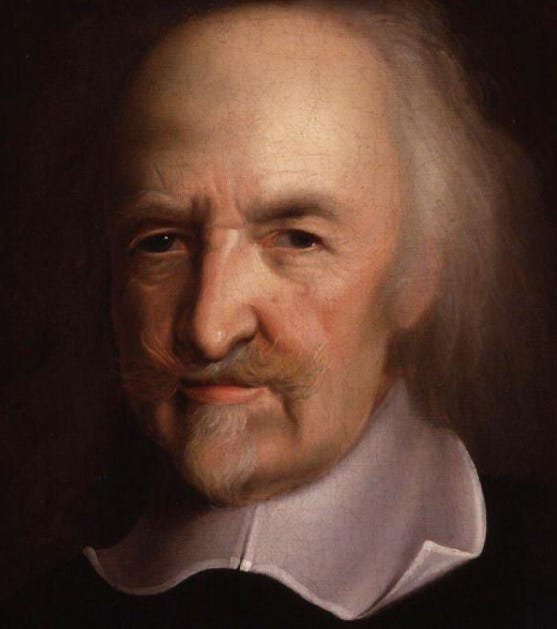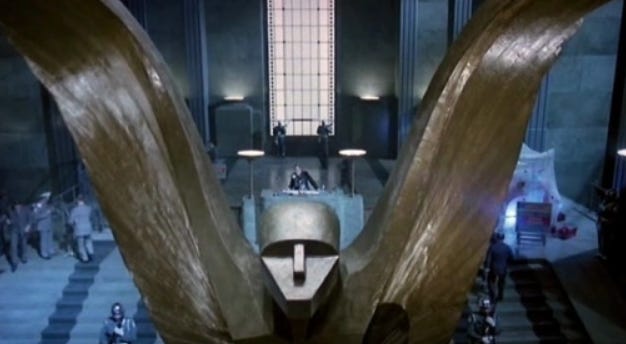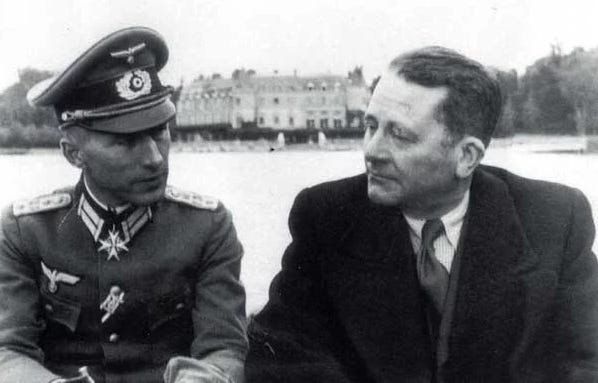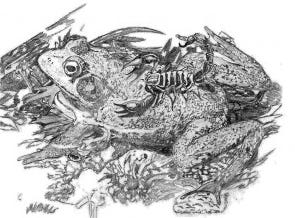I know many of us are still trying to make sense of the seemingly insane, and definitely disturbing, political developments of the past several years. Left and right, up and down, seem all jumbled up. Perhaps most disorienting has been the rapidity of the changes in how ‘Western Liberal Democracies’ behave as political actors.
Personally, for most of my life, I have been used to our governments at least appearing (and obviously trying to appear) to respect freedom, protect civil rights, and maintain credible democratic legitimacy. Much of that may have been hypocritical, superficial, and ideologically motivated, but you could kind of count on it under most circumstances.
So, when most of these regimes used the COVID pandemic to eagerly deploy authoritarian and even totalitarian means, with little attempt to disguise them, it was a little surprising. Of course, those means did not stop with the pandemic. It seems clear the desire, and even the plans, to behave in this way were already there, just waiting for an excuse or opportunity, to be unleashed.
Quickly, and without a blush of embarrassment, our governments set about controlling their populations in ways never before employed on such a scale, to crush political dissent, manipulate information, censor speech, deny civil liberties, politically weaponize judicial institutions, and to label large segments of their own populations as criminal or at least morally irremediable.
Think here of Canadian truckers, Dutch farmers, French Yellow Vests, American parents who dared speak up to school boards because they felt they should have a say in their children’s education, anyone who at all disagreed with the ever shifting COVID narrative, and many other lines that have been drawn to clearly distinguish the smart/virtuous/compliant part of the population from the dumb/evil/non-compliant part. Yes, name calling is central to what is going on, not just an unfortunate aspect of our ‘breakdown of civility’.
For my own part, I’ve come to the conclusion that these swift changes marked not a real change in how the modern State acts, but a dropping of the mask to reveal its true nature. In fact, there seems to be a sort of exhibitionism operating in the perverse pleasure political actors have taken in being openly repressive and duplicitous. They have been liberated to be their true, authoritarian, selves.
Where do we turn in order to try and get a ‘big picture’ understanding of what we have experienced and where we are politically? While there are a good number of contemporary thinkers and journalists (a small minority for sure, but they exist) who are doing good work exposing the (not so) hidden agendas of the globalized regime, I tend to get lost in the interwoven details of all that they uncover.
As a student of the history of political thought, I am tempted to look to the intellectual architects of the neoliberal-technocratic-capitalist machine: John Locke, Adam Smith, John Stuart Mill; people like that. But I’ve come to the conclusion that they didn’t actually understand what were going to be the consequences of their own project.
Instead, I’ve decided that going back to a couple of overt defenders of authoritarianism is the most helpful approach. The first is the 17th century theorist of the State Thomas Hobbes, who most accurately described what a modern state was before any of them actually existed.
The second is the 20th century legal theorist Carl Schmitt (himself a devoted student of Hobbes), who in addition to providing the philosophical basis on which the Nazi Third Reich was able to legally legitimate itself, provided a clear and honest description of the necessarily authoritarian nature of state action.
Here we will try to get a sense of the light these thinkers can shed on our recent and continuing experience by paying close attention to Hobbes’ analysis of state ‘sovereignty’ and Schmitt’s concepts of the ‘friend-enemy distinction’ and of the ‘state of exception’. As we go through each point, just think back over your own observations and experiences of what was going on over the past several years and see what light bulbs come on.
Hobbes’ ‘Mortal God’
What is the State for Hobbes? He famously names the State “Leviathan” (in the book of that name) and “Mortal God”. The State is an “artificial animal”, a technology, which exists to reduce the wills of the many people living under it to “one will” (ie, to conform to a unified will). It will govern through “reward and punishment”. The key factor is that the State possesses absolutely overawing power so that it can impose stability and order over a population occupying a given territory.
Why would we voluntarily create a technology to overawe ourselves and force us into conformity and obedience? Here Hobbes proposes his ‘State of Nature’ theory whereby people are portrayed as necessarily hostile and uncooperative toward one another and hence in a perpetual “state of war”, of “every man against every man”.
Why war? Because Hobbes asserts that, by nature, we are all selfish and acquisitive and we can have no shared moral vision to regulate our conduct toward one another (“But whatsoever is the object of any man’s appetite or desire, that is it which he for his part calleth ‘good’; and the object of his hate and aversion, ‘evil’”). As the Romans said, man is a wolf to man. In such a condition, life is “solitary, poor, nasty, brutish, and short”.
Most emphatically, there is no natural or organic basis to society: Hobbes’s self-conscious modernism lies in his rejection of all pre-modern conceptions of society as a natural organism, especially the Aristotelian view. To escape this condition is the motivation for creating the ‘Mortal God’ whom we will serve and who will bestow upon us (or else withhold) whatever riches and graces it decides.
Ironically, Hobbes admits that this condition never really existed to a broad extent; but it could happen someplace! Never mind that all actually existing traditional communities operated cooperatively and shared a moral vision.
Of course, it’s become almost a common place to point out that the isolated, ‘atomized’, individual presupposed in early modern theory (the liberal theory of Locke, just as much as the authoritarian theory of Hobbes) never actually existed prior to the modern State, but that the modern State more and more produces denatured, alienated, individuals with no substantive identities besides being producers and consumers (see John Patrick Deneen’s Why Liberalism Failed, and Ryszard Legutko’s The Cunning of Freedom, as notable examples).
However that may be, Hobbes goes on to state that Sovereignty is the “artificial soul” of this artificial god; its lifeforce. Here we get to our point. What does this sovereignty entail? What are the necessary powers a State must possess to be a State? Hobbes is quite detailed and specific in enumerating twelve powers (expressed as ‘rights’) a State must exercise to maintain itself in its godlike, unassailably supreme, status:
The right to not be deposed; a State must perpetuate its existence regardless of right and wrong (see 7 and 10 below; Hobbes recognizes no right and wrong beyond what the State defines as legal and illegal); who heads the State may revolve (through elections or whatever), but the State must endure;
The right of exemption from the social contract (the State is ultimately unaccountable to its subjects, otherwise the subjects would be more powerful than the State);
Dissenters to the social contract are compelled to come in (the right of all-inclusiveness); no one and nothing can be thought to lie outside the State’s authority;
The right of immunity; no one may claim the State has harmed them because they retain no rights beyond those granted by the State;
The right of impunity; no one can rightly put the Sovereign to death;
The right to determine which opinions are conducive to peace (explicitly granting the right to censorship and the interpretation of Scripture); the State must have authority over thought and opinion because these lead to action which could lead to challenging the State;
The right to promulgate laws;
The right of judicature; to decide cases based on the laws;
The right to make war and peace (see below on Schmitt’s ‘friend-enemy’ dichotomy);
The right to appoint magistrates, officers, and counselors (note that these are ultimately officials of the State, not representatives of the people);
The right to reward and punish according to the law;
The right to give titles and honors (to establish social ranks).
It is essential to notice the absolutely non-arbitrary nature of the rights Hobbes reserves to the Sovereign. Each one is an essential link in the chain of the supremacy of the State. To compromise any of them would be to open up a weakness in the State by which some other authority could make a counterclaim to power. A State may choose to exercise these rights in ‘nice’ ways if that is deemed politically expedient.
What Hobbes is showing us is the nature of the State. They may not always be explicit about their powers. They may choose to walk softly while carrying their big sticks. Yet, as long as the State remains a State, it implicitly or explicitly relies on asserting these rights.
Schmitt’s Decisionism
Schmitt’s thought is characterized as a form of ‘decisionism’ because it focuses on the central importance of political decision making. Interestingly, Schmitt started out trying to convince the liberal Weimar regime to act decisively against its enemies to the right (the Nazis) and to the left (the Communists), but when it failed to do so, he threw in his cards with the Nazis.
Schmitt’s diagnosis was that a liberal regime would prove too weak to deal with strong political challenges from non-liberal parties if it stuck to liberal principles like individual rights and parliamentarianism.
For our purposes, we will look at the two decisions a State will make that reflect its Sovereignty. Before getting to that though, we should note that Schmitt grounds his understanding of the possible basic approaches to politics in an anthropological observation.
In The Concept of the Political, Schmitt claims that all political ideologies can be divided into two camps depending on how they answer the question: are one’s fellows a danger to oneself or not? Those who answer that people pose a danger to other people fall into the ‘authoritarian’ camp (where Schmitt situates himself). Those who answer in the negative he calls ‘anarchists’ (which includes liberals who would want to limit the sovereign power of the State).
The first essential political decision the State will make is to name its enemies. These may be external enemies (foreign states) or internal enemies (this is done every day via the law naming who will be subject to punishment by the State as ‘criminals’, and, more significantly, in the case of civil war).
For Schmitt, ‘the political’ only arises when two identifiable groups oppose one another in existential threat. This is important in that it points out that much of what we think of as ‘political’ is really just an administrative function of the State’s operation (including elections, the formation of policy, etc…). When two such groups face one another, ‘the political’ in this specific sense is present in the situation.
Schmitt says such opposed groupings might arise out of moral, economic, or religious conflicts (among others). What is at stake is the question of who is going to survive the struggle to, in their turn, rule and exercise sovereignty. When the State names its enemy, this is an expression of its sovereignty (who will be an enemy of the State).1
The second decision is the decision to declare the ‘state of exception’ where law is suspended and the Sovereign operates freely, beyond any legal constraints. According to Schmitt, “he who decides the exception is sovereign”. The logic is clear here. There is no law that is not the expression of the State. Therefore, the preservation of the law is possible only if the State continues to exist and to exercise power.
When the existence of the State is in question, it must act beyond the law to, by all means necessary, preserve itself and preserve the force for order, so that law may be reestablished at a future point. A failed State does not preserve the rule of law. When push comes to shove, the State, not the Law, is sovereign. Hence, even ‘liberal’ States must adopt authoritarian means if they wish to preserve themselves in times of crisis.
Where We Have Come To
The point of looking at these ideas of Hobbes and Schmitt is not to side with them. It is, however, to learn from them. They are two of the most clear-sighted (and honest) proponents of the modern State we have.
What we can begin to comprehend better through reading them is the nature of the modern State. Learning from the fabled example of the scorpion who stings to death the frog who is ferrying it across the rising waters, condemning itself to perish in the process, we should be aware that scorpions do what scorpions do. And states do what states do.
When the State (or another element of the overall regime: international corporations, NGOs, supra-national governing bodies like the EU, the establishment media, etc…) names you an ‘enemy,’ we can recognize that that is happening and what this means from the regime’s perspective.
When the State tramples on our ‘rights,’ we can realize that is part of the sovereign power that is central to the State’s raison d’etre. We can know where we stand. Also pay attention to who is standing over here with us on the ‘enemy’ side of the line; it’s seldom the people you would expect. But the regime knows who its enemies are. It’s quite enlightening.
We can also realize that when the State exerts these powers openly and brazenly, it is an indication that the regime has entered a period of crisis. Hobbes’ ‘Mortal God’, the great Leviathan, is a human technology, a fabrication, aiming at total power. The world’s wisdom traditions have a great deal to say about human efforts to construct ‘gods’.
What can be counted upon is that such ‘gods’ always overreach and are never as omnipotent and omniscient as they believe. While history may be littered with failed rebellions, it is no less littered with failed empires, totalitarianisms, tyrannies, despotisms, and other would be pseudo-deities.
1 For an excellent recent illustration of ‘naming the enemy’ watch President Joe Biden’s Sept. 1, 2022, speech in Philadelphia. Video of the full speech is available here. The red-lit stage setting and his being flanked by US Marines is all part of the message.















Hi LR,
Thanks for the comment. I suspect we may agree on more than we disagree on (maybe). The situation you describe, of communities pulling themselves together to achieve collective ends, I would describe as ‘natural,’ but not what Hobbes means by ‘state of nature.’ Hobbes means unassocisted individuals who then form a modern state. I think Aristotle, whom I mention and who Hobbes has in his sights, was more accurate. For him, we are naturally ‘political animals’ and naturally form increasingly complex associations from the family to villages to polises (smallish self-governing societies). Each level is aimed at allowing us to obtain a higher aim. Thus far I think we mostly agree. Most people extend that to the modern state. Following Hobbes though, I agree the modern state is not a natural association. Something like a republic might fit. Something like a federation of communities might fit. The modern state as described by Hobbes, for me, is problematic and not in line with our nature.
I would encourage you to read my series (part 1 is out, others to follow pretty much weekly) on egalitarian anti-modernism. I hope to see comments from you on that. Will be fun and probably helpful.
Here after getting the link at your "Our Schmittian Moment' article.
Coercive civil authority is inherently, intrinsically evil. Always. And it exists to perpetuate itself, not to protect natural human rights. I wonder how much sooner I would've figured out these truths if not for the propaganda of government schools and government media.